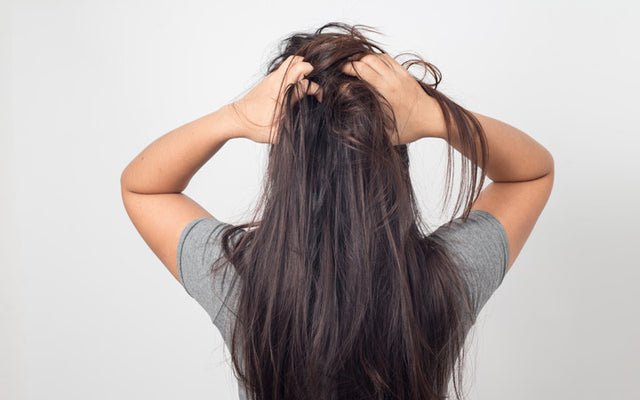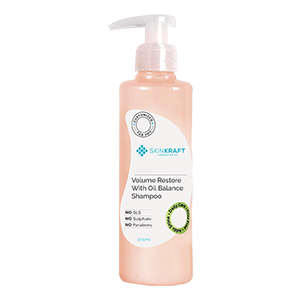Do you find it difficult to keep your fingers off your itchy scalp? If that was not already bad enough, you are experiencing something worse along with it - hair loss! Well, if you’re wondering whether the two have a connection, we are here to answer that for you.
The reasons for an itchy scalp and hair loss can range from harsh hair care to scalp conditions. Thus, it is time to update your hair care and your scalp health. Find out how, besides understanding its link to hair loss.
Highlights:
How Is Itchy Scalp Related To Hair Loss?
When you are scratching your scalp, you're actually weakening your hair follicles. Scalp pruritus [1] or itchy scalp can be a result of fungal infections, allergic reactions to hair care products or inflamed hair follicles. All these may damage the hair follicles and cause hair loss.
Scalp itching, which is a result of dandruff, can cause itching and scratching. Scratching can lead to damage of hair follicles [2] and hair loss.
This kind of hair loss is usually temporary. Permanent hair loss like male pattern baldness [3] may or may not be accompanied by itching. Scratching does not affect this hereditary form of hair loss.
What Are The Possible Causes Itchy Scalp And Hair Fall?
1. Scalp Ringworm
Scalp ringworm [4] is caused due to a fungus and leaves the scalp extremely itchy. You may notice patches of hair loss as the fungus weakens the hair follicles. Your doctor may prescribe anti-fungal creams to alleviate the symptoms of ringworm. After the scalp ringworm is treated, hair grows back.
2. Folliculitis
Bacteria or fungus can cause inflammation of your hair follicles - a condition called folliculitis [5]. This can lead to severe itching and hair loss. Antibacterial and antifungal medications are used to treat folliculitis.
3. Allergic Reactions
Hair care products can irritate your scalp, cause itchiness and inflammation of the hair follicles. Understand which hair care product is causing this allergic reaction and terminate its use.
Check the ingredients of your shampoos, conditioners, hair dyes, gels and sprays. Black hair dyes contain paraphenylenediamine, a common hair allergen. Allergy creams and antiinflammatory drugs help cure this condition. Switch to gentle hair care that suits your hair.
4. Lichen Planopilaris
Lichen planopilaris [6] is a condition where the scalp is inflamed. Doctors believe that this kind of inflammation is due to a compromised immune system. Lichen planopilaris causes scalp itching and hair loss.
5. Alopecia Areata
Alopecia areata [7] leads to hair loss and visible patches on the scalp. This is an autoimmune disorder where the body's cells attack its own hair follicles. Alopecia areata causes scalp itchiness and hair loss. Steroids, immunotherapy and antifungal ointments help in treating Alopecia areata.
6. Atopic Dermatitis
Atopic dermatitis [8] causes a red rash and itchiness. The itchiness can lead to excessive scratching of the scalp and hair loss. Consult your doctor for creams and ointments to treat Atopic dermatitis.
7. Psoriasis
Scalp psoriasis [9] is an autoimmune disorder, meaning the body's immune system attacks its own cells. It causes red patches with silvery scales on the scalp. The itching due to psoriasis can lead to hair loss.
8. Dandruff
Dandruff [10] causes small white flakes on the scalp that can fall off to the shoulders. When the scalp is scratched, it may weaken the hair follicles and lead to hair loss. You can turn to over-the-counter shampoos, ointments and creams.
How To Treat Itchy Scalp With Hair Fall?
Oral or topical steroids reduce scalp inflammation. You can also use antifungals to combat scalp infections caused due to fungus.
Immunotherapy can help with autoimmune scalp conditions. Your hair can be regrown using minoxidil [11] , finasteride or hair transplantation treatments.
Here are some home remedies for itchy scalp and hair loss:
- Essential oils like rosemary and peppermint soothe itchy scalp and can reduce hair fall. Always dilute the essential oil with a carrier oil like coconut or olive oil.
- A balanced diet containing proteins, iron, zinc, selenium, vitamins, biotin and amino acids can promote healthy hair growth. Include eggs, fish, walnuts, legumes, spinach, broccoli and nuts in your diet.
- Use anti-dandruff shampoos containing ingredients like salicylic acid, coal tar, zinc pyrithione, ketoconazole and selenium sulfide to treat dandruff.
How To Prevent An Itchy Scalp And Hair Loss?
1. Avoid the urge to scratch your scalp.
2. Use gentle shampoos free of sulfates, parabens, colors, fragrances and alcohols.
3. Eat a diet rich in vitamins, proteins and minerals like zinc and iron.
4. Follow a good hair care routine - cleansing, conditioning and oiling.
5. Massage your scalp with oils like coconut, olive and castor oil for improved blood circulation.
When To See A Doctor?
Itchiness and hairfall are usually common concerns that can be treated using all of the above methods. However, see your doctor if you notice:
- Itchiness that keeps you up in the night
- Scalp burning or soreness
- Bald patches and hair loss in clumps
- Crusty patches on scalp
Wrapping Up
Hair loss and itchy scalp may not have a direct link in all cases. But when there is an underlying cause, treating it leads to restoring hair loss. Gentle hair care, balanced diet and treating scalp conditions can relieve scalp itchiness and hair loss.
1. https://www.ncbi.nlm.nih.gov/pmc/articles/PMC3233984/
2. https://www.ncbi.nlm.nih.gov/books/NBK470321/
3. https://www.ncbi.nlm.nih.gov/books/NBK278957/
4. https://www.ncbi.nlm.nih.gov/pmc/articles/PMC1125423/
5. https://www.ncbi.nlm.nih.gov/books/NBK547754/
6. https://www.ncbi.nlm.nih.gov/pmc/articles/PMC5833781/
7. https://www.niams.nih.gov/health-topics/alopecia-areata
8. https://www.niams.nih.gov/health-topics/atopic-dermatitis
9. https://www.niams.nih.gov/health-topics/psoriasis
Recommended Products
Was this Article helpful?
- Least helpful
- Most helpful











